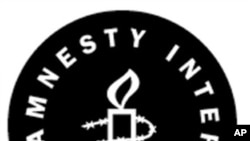A new report by Amnesty International says that nearly four million people are living under Taliban rule in Pakistan's northwestern tribal belt on the border with Afghanistan. But top Pakistani officials have dismissed the report as "unfortunate and incorrect."
The Pakistan-specific report that Amnesty International issued on Thursday is titled "As If Hell Fell on Me", and it focuses on the country's Federally Administered Tribal Area or FATA. In it, the London-based human rights group said that fighting between security forces and Taliban militants has also left at least 1300 civilians dead, but adds the Pakistani government has been reluctant to discuss those realities in public.
Giving details of the report at a news conference in Islamabad, regional director Saman Zia Zarifi, said that over the last few years Taliban militants have used violence and fear to assert their rule as well as ideology in the FATA region.
"They have killed anybody who can challenge them. They have killed hundreds of maliks [tribal elders], religious leaders, civil society workers, teachers, and as a result thousands more of people have fled," said Zarifi.
Taliban militants have also used the civilian population as human shields against military assaults and often take shelter in residential areas, according to Zarifi. He said these tactics have led to the deaths of hundreds of civilians in addition to thousands of militants and security forces.
"There is no doubt that the Taliban inflicted a rule of terror and deprivation in the area. But unfortunately the government when it finally moved, especially in FATA, and engaged in military operations, in many instances the government acted as if its role was simply to kill the enemy as if it was not there to protect the citizens of Pakistan," Zarifi said.
But the Pakistani minister for human rights, Mumtaz Alam Gilani, has rejected the Amnesty report calling it "unfortunate and incorrect." Pakistani security forces have made significant gains against Taliban militants and have uprooted their bases in most parts of FATA, said Gilani.
"When there is a war there is no civil right, there is no court and these areas are traditionally beyond the normal laws. We are getting hold of different places to manipulate and to further forward our attack on the enemy," said Gilani. "They are on the run now. They are not on the attack. So such type of reports, they discourage the government of Pakistan 's intentions and attitude [and] they do not help."
The Amnesty report also states that nearly one million people displaced by the anti-insurgency military operations last year and still living in towns are in need of urgent help. It also criticized the detention of more than 2,000 suspected Taliban fighters who have not been charged.
Pakistani officials, however, dismiss these concerns by saying they have already initiated court cases against dozens of detainees after completing investigations into their links with militant groups.
Amnesty International has urged the Pakistani government to introduce long-awaited and promised reforms in the tribal areas. U.S officials believe Pakistan's FATA region is a safe haven for Afghan Taliban and al-Qaida militants involved in cross-border attacks on international forces in Afghanistan.




